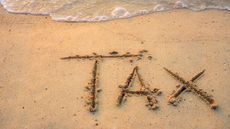Iowa State Tax Guide
State tax rates and rules for income, sales, property, fuel, cigarette, and other taxes that impact Iowa residents.
- (opens in new tab)
- (opens in new tab)
- (opens in new tab)
- Newsletter sign up Newsletter

Bottom Line
Middle-Class Families: Least Tax-Friendly (Go to the Kiplinger Tax Map for Middle-Class Families)
Retirees: Least Tax-Friendly (Go to the Kiplinger Tax Map for Retirees)
Which do you think is higher in Iowa: the corn or taxes? It might be taxes, thanks to steep income and property taxes in the state. One reason why income taxes are on the high end in the state is because over 200 school districts and Appanoose County add their own income taxes on top of the state-level tax. But at least relief is on the way in the form of reduced state income tax rates over the next few years.

Sign up for Kiplinger’s Free E-Newsletters
Profit and prosper with the best of expert advice on investing, taxes, retirement, personal finance and more - straight to your e-mail.
Profit and prosper with the best of expert advice - straight to your e-mail.
Property taxes in the Hawkeye State are high as well. The median property tax rate in Iowa is the 10th-highest in the nation, which certainly doesn't help homeowners in the state.
Sales taxes are only "average," but that doesn't help much with the state's overall tax burden on most residents.
Iowa Income Taxes
Iowa Income Tax Range
Low: 0.33% (on up to $1,743 of taxable income)
High: 8.53% (on taxable income over $78,435).
Alternative tax rates and computation methods are allowed for certain lower-income taxpayers. Iowa also has local income surtaxes used for schools and emergency medical services.
Beginning in 2023, the lowest Iowa personal income tax rate will be 4.4% (on up to $6,000 of taxable income for single filers and up to $12,000 of taxable income for joint filers), while the highest rate will be 6% (on more than $75,000 of taxable income for single filers and more than $150,000 of taxable income for joint filers). The top rate will drop to 5.7% in 2024 and then to 4.82% in 2025. Starting in 2026, a flat rate of 3.9% will apply.
Iowa Taxation of Social Security Benefits
Social Security benefits are not taxed by the state.
Iowa Tax Breaks for Other Retirement Income
Until 2023, taxpayers age 55 or older can exclude up to $6,000 ($12,000 for joint filers) of federally-taxed income from a pension, annuity, self-employed retirement plan, deferred compensation, IRA, or other retirement plan. Beginning in 2023, all retirement income is exempt for taxpayers who are at least 55 years old.
Military pensions and Railroad Retirement benefits are fully exempt.
Iowa Sales Tax
6% state levy. Localities can add as much as 1%, and the average combined rate is 6.94%, according to the Tax Foundation.
- Groceries: Exempt
- Clothing: Taxable
- Motor Vehicles: Exempt from ordinary sales tax, but subject to 5% one-time registration fee
- Prescription Drugs: Exempt
Iowa Real Property Taxes
In Iowa, the median property tax rate is $1,501 per $100,000 of assessed home value.
Iowa Property Tax Breaks for Retirees
A property tax credit of up to $1,000 is available to residents age 65 or older. For 2022, the program is limited to those with a 2021 household income less than $24,354. In addition, beginning in 2022, special rules are used to calculate the credit for residents who are at least 70 years old with an annual household income of not more than 250% of the federal poverty level.
Iowa Motor Fuel Taxes
Gasoline: 30¢ per gallon.
Diesel: 32.5¢ per gallon.
Iowa Sin Taxes
Cigarettes and little cigars: $1.36 per pack
Snuff: $1.19 per ounce
Other tobacco products: 50% of the wholesale price, not to exceed $0.50 per cigar
Beer: $0.19 per gallon
Wine: $1.75 per gallon
Liquor: $13.03 per gallon (the liquor tax is an estimate by the Distilled Spirits Council of the United States and published by the Tax Foundation)
Iowa Estate and Inheritance Taxes
Beginning in 2021, Iowa started phasing out it's inheritance tax over a five-year period by reducing the rate of tax by 20% each year (the original base rates ranged from 5% to 15%). For 2023, Iowa's inheritance tax ranges from 2% to 6%, depending on the amount of the inheritance and the relationship of the recipient to the decedent. However, no tax is due on property left to a surviving spouse, stepchildren, lineal descendants (children, grandchildren, etc.) or lineal ascendants (parents, grandparents, etc.). In addition, no tax is due if the estate's net value is less than $25,000. For 2023, brothers, sisters, sons-in-law and daughters-in-law owe 2% to 4% in tax, depending on the value of the property they inherit. Uncles, aunts, nieces, nephews and all other people inheriting property in 2023 are taxed at rates ranging from 4% to 6%. The tax is completely repealed on January 1, 2025.
Rocky Mengle was a Senior Tax Editor for Kiplinger from October 2018 to January 2023 with more than 20 years of experience covering federal and state tax developments. Before coming to Kiplinger, Rocky worked for Wolters Kluwer Tax & Accounting, and Kleinrock Publishing, where he provided breaking news and guidance for CPAs, tax attorneys, and other tax professionals. He has also been quoted as an expert by USA Today, Forbes, U.S. News & World Report, Reuters, Accounting Today, and other media outlets. Rocky holds a law degree from the University of Connecticut and a B.A. in History from Salisbury University.
-
-
 Consumers Won't Cut Mobile, Internet Spending, Despite Inflation: Kiplinger Economic Forecasts
Consumers Won't Cut Mobile, Internet Spending, Despite Inflation: Kiplinger Economic ForecastsEconomic Forecasts Consumers Won't Cut Back on Mobile or Internet Spending, Despite Inflation: Kiplinger Economic Forecasts
By John Miley • Published
-
 Courts to Rule on Agency Powers: Kiplinger Economic Forecasts
Courts to Rule on Agency Powers: Kiplinger Economic ForecastsEconomic Forecasts The scope of agency power is under the spotlight in cases in the Supreme and Federal Courts: Kiplinger Economic Forecasts
By Letter Editors • Published
-
 Half of Mothers Have Little or No Retirement Savings
Half of Mothers Have Little or No Retirement SavingsMother’s Day is here, but many moms face future financial insecurity because they have little or no retirement savings.
By Kelley R. Taylor • Last updated
-
 Having a Baby Could Soon Cost Less in These States
Having a Baby Could Soon Cost Less in These StatesHaving a baby is expensive, but these states are trying to make it less costly by eliminating the tax on diapers.
By Katelyn Washington • Published
-
 The Most Expensive States to Die In (Due to Death Taxes)
The Most Expensive States to Die In (Due to Death Taxes)You probably know the cost of living in your state, but what about the cost of dying — death taxes?
By Katelyn Washington • Published
-
 Is High-Yield Savings Account Interest Taxable?
Is High-Yield Savings Account Interest Taxable?Think a high-yield savings account is a good idea? Don’t forget that savings account interest is taxable.
By Katelyn Washington • Published
-
 2023 Georgia Tax Rebates Up to $500 Are Now Being Sent
2023 Georgia Tax Rebates Up to $500 Are Now Being SentGeorgia has started sending special 2023 surplus tax refunds to eligible residents.
By Kelley R. Taylor • Published
-
 Is Your Scholarship Tax-Free or Taxable?
Is Your Scholarship Tax-Free or Taxable?Scholarships are generally tax-free if certain IRS and other requirements are met.
By Kelley R. Taylor • Published
-
 Oklahoma Storm Victims Have an Extended IRS Tax Deadline
Oklahoma Storm Victims Have an Extended IRS Tax DeadlineOklahoma taxpayers impacted by severe April storms have an extended tax filing and tax payment deadline.
By Katelyn Washington • Published
-
 10 States With the Lowest Sales Tax
10 States With the Lowest Sales TaxDon't rush to a state with low sales tax if your goal is to save money.
By Katelyn Washington • Published









